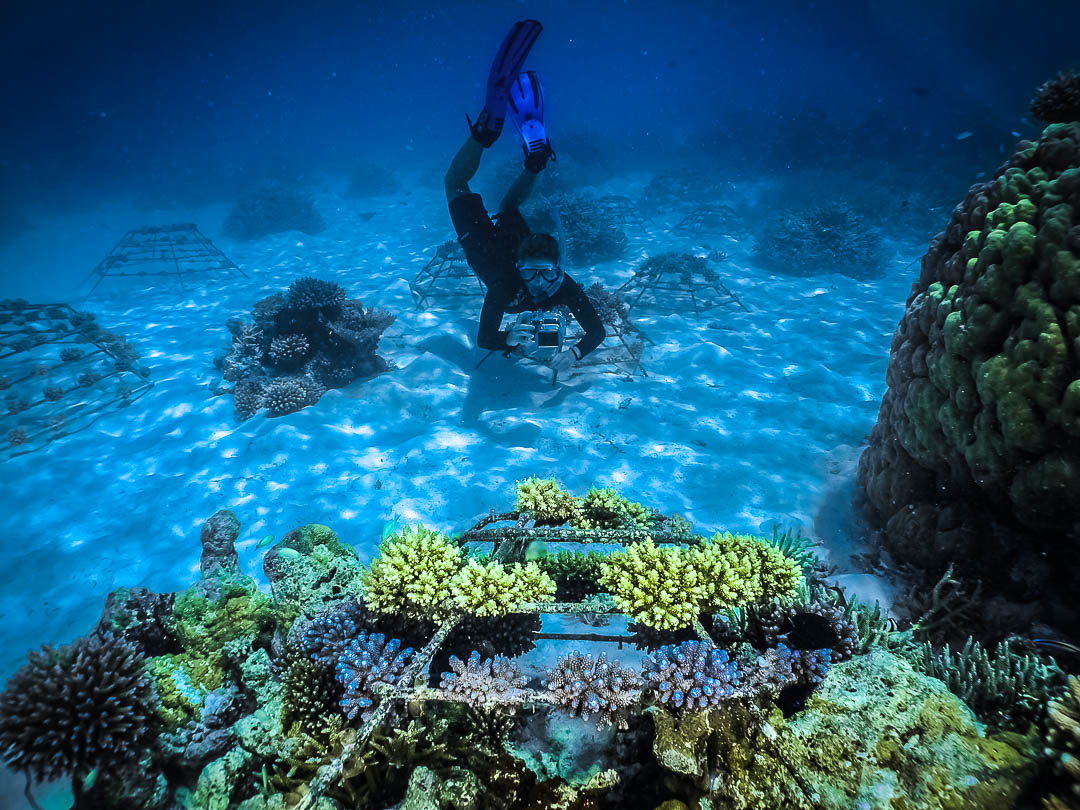
Reefs right around the world are in strife—we all know this. Between warming waters, rising acidification, coral bleaching, yellow-blotch disease, over-fishing, climate-change and El Niño triggered mega-storms, oil spills, crown-of-thorn starfish invasions, sewage dumps and clumsy clod-footed tourists, life has never been harder if you happen to be part of a naturally occurring colony of sessile cnidarian polyps.
Which is a shame. And not just for the ill-treated little creatures. Because the vast kaleidoscopically colourful super organisms that they combine to form a crucial part of our planet’s ecosystem. Not only are they the sub-aquatic equivalent of rainforests, hosting algae that gulps in carbon and whispers out oxygen, they also provide food and shelter for a vast array of other animals, from the microscopic to the mighty.
But what you may not know is that it’s possible to build new, fully functional, living and breathing reefs—and you can get involved, either from the comfort of your web-surfing chair or whilst enjoying a luxury holiday. You can become a reefscaper.
Reefscapers is an innovative coral propagation project overseen by Marine Savers. It began in 2001, when an environmental consultancy company called Seamarc began working with the Maldives Four Seasons Resort to try and improve the aesthetics of the local reef, which had been devastated by a dramatic bleaching event in 1998, during which 90 per cent of the country’s shallow water corals died.
Dead coral is as bad for business as it is for the ecosystem, but the solution Seamarc conceived was as simple as it was effective: live coral fragments were attached onto a welded frame (made locally), which was then ‘planted’ on the seabed, where they hoped it would grow and spawn and breed and evolve. It did all of the above, and the results were so wildly successful that the concept has become synonymous with reef propagation.
https://vimeo.com/54370746
‘It is not an artificial reef,’ Sebastien Stradal, manager of the Marine Discovery Centre on Laanda Giraavaru firmly corrects me when I ask him about the highly active project that has been unfolding around Baa Atoll, a UNESCO Biosphere Reserve in Maldives. ‘It’s real reef, formed by real coral, which has transplanted onto frames we have placed on the seabed. Ours is the biggest reefscaping project in the world.’
At the time of writing there are 2840 coral frames dotted around the Indian Ocean floor close to Landaa Giraavaru, and some 5,000 across the islands of the Maldives, but with 35 more coral climbing frames being planted each month, those numbers are literally growing every day. A bit like the coral itself.
‘At first progress can seem slow,’ Stradal explains. ‘But after 18 months or so, you can see growth of up to 10cm a year. Then there’s maintenance to do—it’s a bit like a garden, you have to tend to it, clean it and take away the dead fragments.
‘If some die, we transplant those with species that we’ve observed doing better. We work with around 50 types of coral, including various table, branching and digitate species. These are strong and easy to transplant. They grow fast, but they’re complex, providing shelter for lots of fish, which is good for the guests and good for the habitat.’
As the corals grow, they don’t simply provide a new healthy home for marine life, they also play a large part in stopping coastal erosion—a huge problem in Maldives and elsewhere, especially in the low-lying parts of the world. The oldest coral frame colonies have now reached a stage that they are themselves spawning, creating new baby corals.

It’s clever stuff, but it’s the way the project is funded that reveals the real ingenuity of the idea. The backbone of the initiative is a sponsorship programme whereby guests (and prospective guests) at the Four Seasons can get involved by purchasing a coral frame, which has their name inscribed on a tag. They can then check the evolution of the section of reef that they have contributed towards, with new photos and videos being posted by divers every six months.
Of course, you don’t need to be in the Maldives, or even be planning a visit, in order to get involved. Love Nature has sponsored a frame, and we will be bringing you updates as we get them, but don’t live vicariously through us, go get your own chunk of reef—it’s cheaper and easier than setting up a home aquarium, and you’ll be helping to improve the health of the ocean.
—
Want to experience the mighty oceans in stunning Ultra-High Definition? Why not browse our exclusive 4K Nature Scenes and documentaries of the deep blue, now available via our app.
